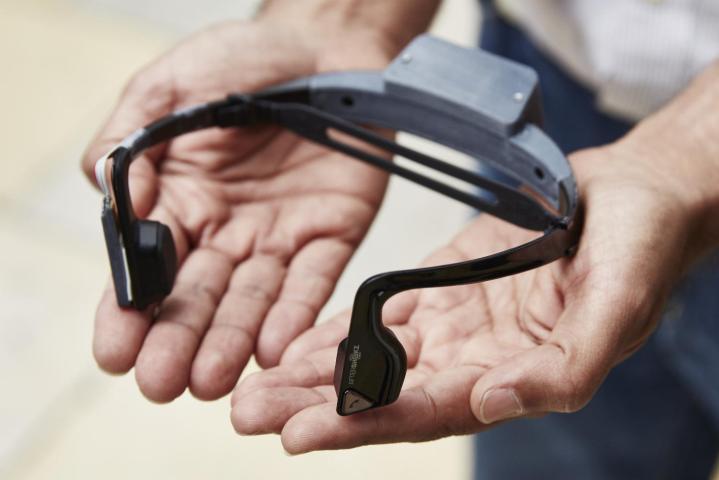
Here’s how it works. The headset doesn’t cover your ears, but uses bone-conducting audio to ensure you’re always aware of your surroundings. Once it is paired with a Windows Phone mobile device, it picks up signals from Bluetooth beacons spread around the city, and creates a 3D audio map using a combination of clicks, beeps, and verbal descriptions.
The sound is directional and alters in pitch and tone, so it can be used to lead someone to their destination, much like a digital guide dog. Because some of the audio map is generated using Bing and Google maps, it can provide contextual information along the way, including street names, points of interest, public transport locations, shops, and even details on road works. The headset appears to be a modified version of Aftershokz Bluez headphones, and has GPS, an accelerometer, and a gyroscope inside, so it knows which way the wearer is facing, and if they turn their head.
Currently only a prototype, the headset is being paired with a Lumia 930 and Lumia 1520 for tests, which have been taking place along a specially designed route between London and nearby city Reading. According to research, there are 180,000 people with sight loss in the UK who find it too stressful to leave their homes. The Cities Unlocked project wants to change that using its augmented reality headset, and in these early tests 62 percent of wearers felt safer, and more confident when wearing it. It’s also hoped the headset will increase spontaneity, independence, and mobility.
Microsoft’s tech won’t replace the hard-working guide dog, or even a cane, but it has potential to enrich people’s lives. One volunteer working on the project told a local newspaper, “There are things the technology can’t do, like tell me when there is traffic coming, so I would keep my dog for those purposes, but knowing that there is a post box coming up, or that there is a bank nearby is very helpful.”
It’s still early days for Cities Unlocked, and before the headset can be used widely, our cities need to become smarter. For now, it’s a fascinating glimpse into how wearable technology, Bluetooth beacons, and smartphones can help improve lives when used together.



